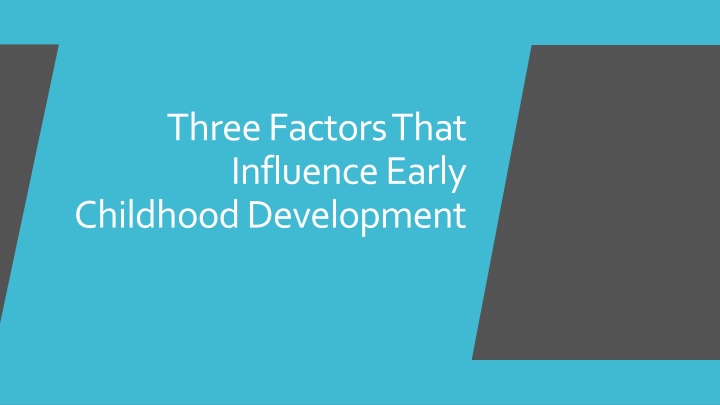
Factors Influencing Early Childhood Development
Discover the three key factors influencing early childhood development, including stress management, cultural influences, and environmental impact. Learn how parents can support their children through stress, the role of culture in shaping behaviors, and the importance of positive environments for cognitive and social growth.
Download Presentation

Please find below an Image/Link to download the presentation.
The content on the website is provided AS IS for your information and personal use only. It may not be sold, licensed, or shared on other websites without obtaining consent from the author. If you encounter any issues during the download, it is possible that the publisher has removed the file from their server.
You are allowed to download the files provided on this website for personal or commercial use, subject to the condition that they are used lawfully. All files are the property of their respective owners.
The content on the website is provided AS IS for your information and personal use only. It may not be sold, licensed, or shared on other websites without obtaining consent from the author.
E N D
Presentation Transcript
Three Factors That Influence Early Childhood Development
Can be caused by positive changes but is usually followed by or associated with negative changes. Excessive stress can change a child s personality. Stressor examples: pain, injury, illness, bullying, negative thoughts, moving, homelessness, body changes, money problems, unsafe neighborhood, worries about school, etc. Parents can help ease their child s stress by recognizing the stressor and finding healthy ways for them to deal with it. A safe home Family routines Being a role model by having your own stress under control Children should be informed on any major changes well in advance Listening to the child without trying to solve their problem immediately, work with them to help them understand what is upsetting them. Give them some control over their life, if they feel like they have control of the situation their reaction will be less severe. Don t punish them for their reaction to stress. Stress
A picture containing text, compact disk Description automatically generated
When parents interact with their children, they bring their own way of doing things into it, which is the weight of their beliefs and their culture. Parents may have a different view of what is right for their child. Parents who actively cope with racism in a healthy way by confronting the person or group lesson their children s anxiety who s in early childhood. The mothers well being when it comes to her culture severely impacts her child and her relationship with the child. Children who grow up in individualistic cultures are encouraged to make their own decisions from a young age and learn how to be self sufficient earlier. On the other side children who grow up in interdependentcultures grow up with being focused on community and their connections. As they develop, we see they are more likely to ask someone for help instead of figuring things out on their own. An example is that European American families treat their young child as equals when it comes to conversation. Then Puerto Rican mothers focus on the manners of their child. Culture There needs to be communication between educators and other people who are a main part of the child s life about the cultural aspects of the family. Lack of communication can cause stress and confusion for a young child. They will feel like they have two different lives and not be able to balance the two.
The environments a child experiences outside of the home are important to their overall development. The objects, sights, and sounds they are surrounded by completely shape the cognitive, social, and physical developments they experience. When a child lacks a good environment their brain development can be stunted. Risk Factors: Poverty, maternal depression, and lack of maternal education. Negative home environments can cause developmental effects such as poorer language development and impaired cognitive development. The negative environment a child is in for their first three years of life makes a child more likely to have teen parenthood, not graduate, or have bad adult employment. Noise, crowding, chaos, housing (type/quality), schools, childcare, and more are all environmental factors that can positively or negatively affect early childhood development. Pollution and toxins can influence development of motor skills. Lead has been known to cause aggression, impulsivity, and hyperactivity in children. Environment






















